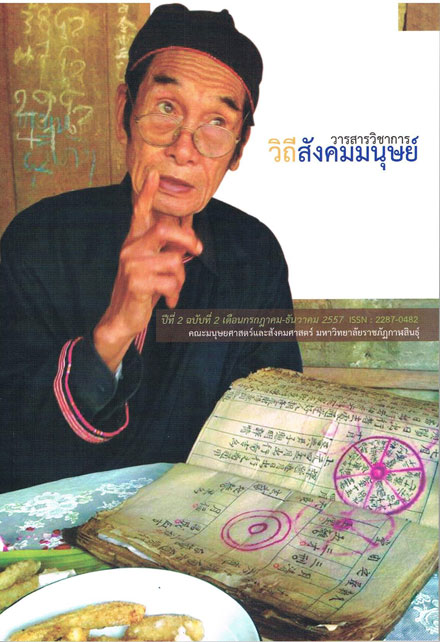The Rocket บุญติดจรวด : มายาคติของความเป็นหลังอาณานิคมในภาพยนตร์ลาว
คำสำคัญ:
หลังอาณานิคม, มายาคติ, ภาพยนตร์ลาว, Postcolonialism, Myth, Laos’s Movieบทคัดย่อ
บทความนี้ เป็นการศึกษามายาคติว่าด้วยความเป็นหลังอาณานิคมในภาพยนตร์ลาวเรื่อง The Rocket บุญติดจรวด โดยใช้กรอบแนวคิดด้านหลังอาณานิคม วาทกรรมและอัตลักษณ์ ผลการศึกษาพบว่า ในเรื่องเล่าที่ถูกสร้างผ่านมุมมองของชาวต่างชาติที่มีต่อประเทศลาว ยังคงแฝงมายาคติเรื่องของอคติทางชาติพันธุ์อย่างเด่นชัดคือ การสร้างภาพคนลาวให้เป็นชายขอบในลักษณะของการเหมารวมคือ การด้อยในเรื่องวัฒนธรรมและวาทกรรมการพัฒนาในรูปแบบโครงการเขื่อนของรัฐได้เข้ามามีบทบาทต่อชุมชนคนลาว ทำให้ต้องกลายเป็นคนพลัดถิ่น และกลุ่มคนดังกล่าวได้แสดงการโต้วาทกรรมหลังอาณานิคมกระแสหลักโดยการหันไปสู่ความเป็นท้องถิ่นนิยมผ่านการประดิษฐ์สร้าง ประเพณีบุญบั้งไฟภายใต้ระบบความเชื่อแบบแถน บั้งไฟจึงกลายเป็นสัญญะ (Sing) ในการต่อสู้และต่อรองกับชุดความคิดแบบหลังอาณานิคมที่ไม่ได้อยู่ในรูปแบบของการทหารแต่เป็นการปรับเปลี่ยนรูปแบบที่ซับซ้อนในชุดของวาทกรรมความรู้และการพัฒนาเพื่อสร้างความด้อยหรือความเป็นอื่นให้กับประเทศที่มีวิถีปฏิบัติทางสังคมต่างจากตนเองเรื่องเล่าในภาพยนตร์จึงทำหน้าที่ฉายภาพแทนทางสังคมว่าด้วยมายาคติของลัทธิหลังอาณานิคมได้อีกทางหนึ่งThis article aims to examine the myth on being the postcolonialism in Laos’s movie: the rocket (sudden merit). The conceptual frameworks used in this study are postcolonialism, discourse, and identity. The study shows that the story telling produced through foreigners’ viewpoints towards Laos has been still hidden the myth on ethnics prejudice explicitly as follow. The representation of Laos people to be the margins in generalization that is deculturation and development discourse towards state’s dam project which impacts Laos people become diasporas. These people have debated the discourses in the mainstream postcolonialism by turning to localism through the rocket festival invention under the belief of Thaen. The rocket has become the sign of struggle and negotiation with the forms of thoughts in the postcolonialism, not the military form. In contrast, it is the complicated forming adjustment in forms of knowledge and development discourses in order to construct inferiority or being others for the country having the social practical path which differs from oneself. The story telling in the movie plays the role of portraying illustrations for societies on the myth of postcolonialism alternatively.
ดาวน์โหลด
ฉบับ
ประเภทบทความ
บทความ (Articles)



